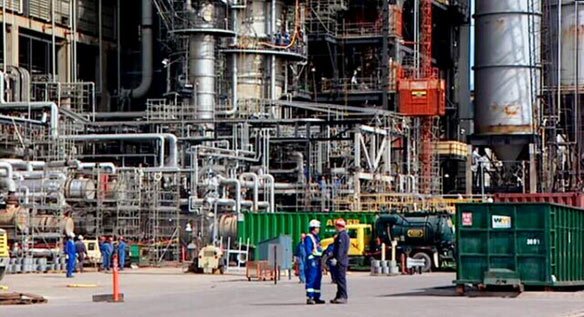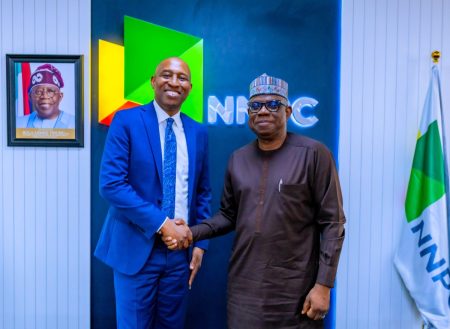
30 August 2013, Lagos – Local and foreign companies that won about 77 oil blocks in the oil licensing rounds conducted by the federal government in 2005, 2006 and 2007 are yet to bring 76 of the blocks into production, thus effectively stalling about $40 billion in investments that they pledged in the country’s rail, power and downstream infrastructure sectors.
It has also emerged that the Shell Petroleum Development Company, SPDC, may offer three more Nigerian oil blocks for sale in line with its divestment plan. The blocks likely to be sold, according to sources, are Oil Mining Leases, OMLs, 74, 77 and 79, which were among the expired leases four years ago.
Speaking thursday in Lagos, on the “Review of 2005-2007 Licensing Rounds and Government’s Perspectives”, the Director of the Department of Petroleum Resources, DPR, Mr. George Osahon, stated that the inability of these investors to meet their work obligations in the 76 blocks, had also hampered the federal government’s efforts to meet crude oil reserves targets of 40 billion barrels and a daily production of four million barrels per day.
He disclosed that only one oil blocks was producing among all the acreages offered to investors in 2005, 2006 and 2007, while only a few Production Sharing Contracts, PSCs, had been signed with the winners of the leases.
A total of 44 oil blocks were awarded in the 2005 licensing rounds, while 16 and 17 acreages were awarded in 2006 and 2005, respectively, by the administration of former President Olusegun Obasanjo.
Aside the payment of signature bonuses, which amounted to several billions of dollars, the successful bidders also pledged to make investments worth about $40 billion in the construction of rail system, power plants, refineries and other downstream infrastructures.
In a bid to drive investments to needed areas such as power generation, downstream and railway construction, the federal government gave the right of first refusal on some of the blocks offered in May 2007 to companies that pledged to invest a minimum of $2 billion into these areas.
However, the major oil companies shunned the 2007 bidding because many of the blocks offered by the government were retrieved from them over their failure to develop the blocks within the time-frame allowed by the government.
Osahon, however, noted that though the federal government was not interested in revoking the blocks, something needed to be done urgently to address the challenges facing the operators.
“Only one block is on production, while less than 30 per cent of blocks are actively worked; several PSCs are yet to be signed; bank guarantees are yet to be put in place; work obligations not respected; at a crossroads with concessionaire over order of operations; while downstream obligations are not performed,” he explained.
On the way forward, Osahon charged the awardees and operators to take advantage of yesterday’s forum to build relationship with prospective investors and financial institutions and also build synergies where possible, as in contiguous blocks for data acquisition or conjugate development.
He assured that the DPR would entertain concern of awardees within the next three weeks.
According to him, specific challenges such as evacuation and downstream project obligation and other issues or obstacles to operations should be addressed.
He said the government was concerned over the wrong impression about the investment climate in the Petroleum Industry Bill, PIB; limited attraction for investors; limited activities in the industry; and the inability to establish national competitive advantage in the global energy scene.
Osahon listed security issues; technical challenges; partnership issues and limited capacity and financing as some of the challenges facing the operators.
However, Essar Energy, operator of OPL 226 said its major challenge was that it was chasing oil and gas in deep water, even though the acreage is shallow water by definition.
The company said with this challenge, it would require subsea infrastructure, thus requiring more time to meet its work obligations.
The company also noted that with the roll over extension of Exploration Phase 1 into Phase 2 expiring in March 2014, the exploration phase 1 would require further extension to 2015.
The Managing Director of Oando Exploration and Production Limited, operators of OPL 278, Mr. Pade Durotoye, said his company was facing the challenges of security; acquiring seismic data and difficult terrain as the block had both land part and marine part.
Meanwhile, THISDAY gathered that the delay in the renewal of the oil licences more than four years after, might have prompted Shell’s resolve to sell the oil blocks.
Shell, the biggest operator in Nigeria, has onshore assets that can produce as much as one million barrels of crude oil per day. Its partners in these projects are the Nigerian National Petroleum Corporation, NNPC, Italy’s Eni and France’s Total.
Several onshore drilling licences belonging to Shell and Chevron, which expired as far back as 2009 have not been renewed, despite federal government’s assurance that the oil licences would be renewed in 2012. The oil blocks are OMLs 71, 72, 74, 77 and 79.
A Shell spokesman, Precious Okolobo, declined to respond to inquiry on the planned sale of the oil blocks. “We do not have any comment on your inquiry”, Okolobo said, in an SMS message.
However, it was gathered that the delay in the renewal of the oil licences, might have prompted Shell’s resolve to sell the oil blocks.
The Royal Dutch firm in July announced that it would sell four more oil blocks in Niger Delta in its latest divestment from Nigeria. The blocks put up for grab included OMLs 71 and 72, which licences were awaiting renewal by the Minister of Petroleum Resources.
Industry sources said the OML 72 has proven oil reserves of around 120 million barrels, while OML 71 has significantly lower reserves. The two onshore blocks, lie in the Ogoniland region where Shell had experienced long-running disputes with local communities, multiple oil spills and widespread pipeline sabotage and theft.
It was learnt that the oil majors were initially reluctant to pay the amount, which the Ministry of Petroleum Resources said was the required signature bonuses for the oil blocks.
They were said to have initially viewed the renewal of the licences as their right but became jolted after the China National Oil Corporation, CNOOC, made a $50 billion offer to the federal government to acquire a 49 per cent stake, translating to 6 billion barrels in oil reserves in 23 of the oil leases held by the IOCs.
The CNOOC, acting under the auspices of Sunrise Consortium had applied for 49 per cent equity participation in the following blocks: OMLs 67, 68, and 70; ii. OMLs 11 and 13; iii. OMLs 71, 72, 74, 77, 79, 83, 85, 86, 88, 89, 90, 91, 95, 118, 127, 133, 139 and 140.
Chevron and Exxon, after the expiration of their oil licences expired in November, 2008 had won a year’s extension, but Shell had sought a court injunction allowing it to continue to operate.
However the federal government, through the Ministry of Petroleum Resources in November 2008, renewed three shallow water oil licences jointly operated by the NNPC and Exxonmobil, granting it (Mobil) leases for a further 20 years with the option to renew again.
The US oil major was said to have paid an estimated $600 million signature bonus as revenue to the federal government for the three blocks estimated to have a combined output of 580,000 barrels per day of crude are OMLs 67, 68 and 70. Shell, which later withdrew its court case against the government was seeking the renewal of five of its leases – OMLs 71, 72, 74, 77 and 79.
The NNPC’s Group Executive Director in charge of Exploration and Production, Mr. Abiye Membere, explained that the DPR, which was in charge of regulatory issues, had been instructed to put together a template for renewal of oil licences.
He explained that due to lapses discovered in the past ones handled by the NNPC, the Minister of Petroleum Resources, Mrs. Diezani Alison-Madueke, on assumption of office, issued directives that all regulatory issues be handle by the DPR henceforth. Membere said, the minister had also directed the DPR to put together a new template which will serve as a guide for renewal of oil block licences, adding that the issue of what the oil companies should be paid had already been settled.
– Chika Amanze-Nwachuku and Ejiofor Alike, This Day



